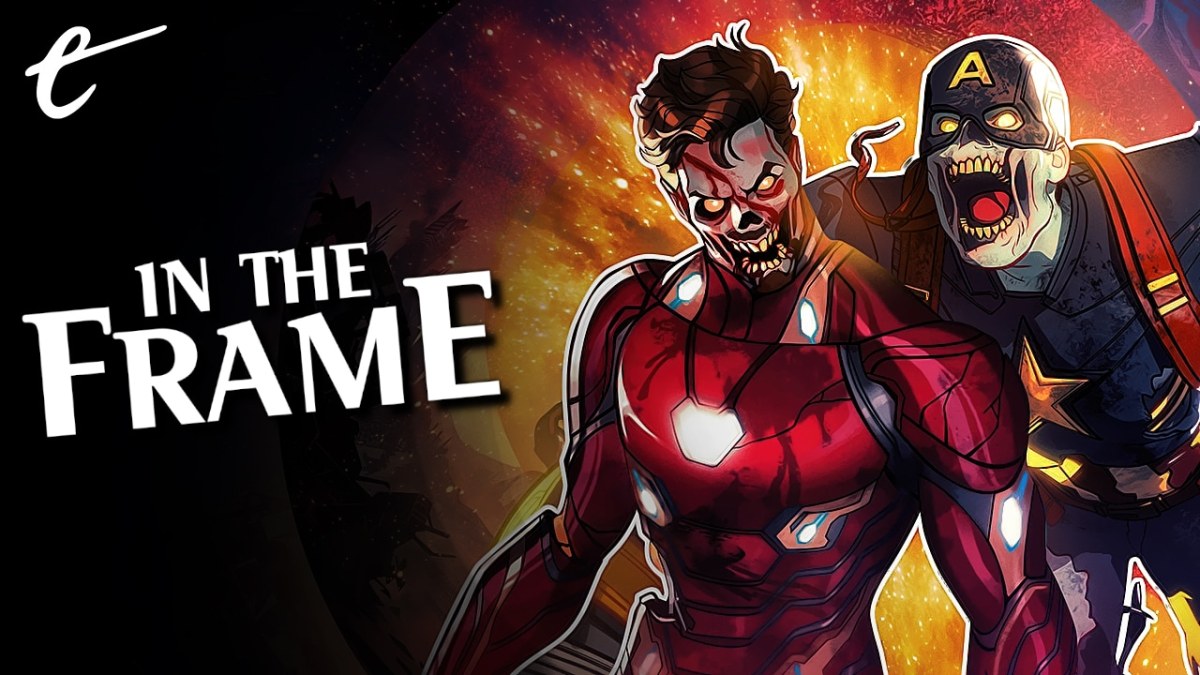To resurrect an undead comedy cliché: What is the deal with Marvel Zombies?
Last week’s episode of What If…? introduced the Marvel Zombies into the Marvel Cinematic Universe (MCU). The concept of Marvel Zombies is intuitive, implied by the title, “What if your favorite superheroes were also zombies?” It’s a fairly easy-to-follow premise, up there with “What if your favorite superheroes were also babies?” and “What if your favorite superheroes were also apes?” People like superheroes; people like zombies. Put them together and magic happens.
However, there is something fascinating in the lasting appeal of the Marvel Zombies as a brand. After all, the concept began as a wry joke in Mark Millar and Greg Land’s Ultimate Fantastic Four and has since spun off into (quite a few) spinoffs and miniseries, a prestige collection, several toy collections and even video game easter eggs. The Marvel Zombies are a sub-brand unto themselves, a strange but enduring intellectual property tucked away under the Marvel umbrella.
At the same time, it is interesting that the Marvel Zombies have endured in popularity. They made their first appearance in Ultimate Fantastic Four #21, published in July 2005. This was at a time when zombies were ubiquitous in popular culture. Released in 2002, Danny Boyle’s 28 Days Later… is credited with starting “a revolution” in zombie media. The years that followed saw an explosion in zombie films: Shaun of the Dead, Land of the Dead, Planet Terror, Dead Snow, Zombieland.
As with most horror trends, the obsession with zombies gradually petered out. By the time that the Marvel Zombies made their MCU debut in What If…?, it seemed like the moment had passed. The Walking Dead is in its final season. Recent high-profile zombie films, like Zombieland: Double Tap or Peninsula, have tended to be sequels to movies released at the height of the craze. David Fincher and Brad Pitt’s sequel to World War Z was canceled.

The Marvel Zombies endure. Their appearance was a major selling point for What If…?. A zombified version of Captain America appeared hidden in the “W” of the title art revealed in July 2019. The first art was teased in the Marvel Studios: Expanding the Universe special in November 2019. There is some suggestion that this is simply the beginning. In a recent email newsletter, creator Mark Millar hinted at the possibility of “a little live-action Marvel Zombies further down the line.”
So, why does this particular concept linger? Why haven’t other novelty takes like Marvel Apes or Larval Earth or that universe where all the Avengers have beards caught on in this manner? Perhaps there is something particularly evocative in the concept of these monstrous superheroes. Perhaps these zombified icons resonate in a particular way, both in the wider context of popular culture and the more specific context of these Marvel Studios projects.
At its most basic level, the Marvel Zombies reinvent the superhero as a horror story. There is something inherently unsettling and disturbing in seeing these heroic characters repurposed in a grotesque and horrific manner. Superheroes are supposed to represent an ideal, so there is a power in perverting that. This is particularly true in an era where people are increasingly distrustful of institutions and wary of how power can be abused.
Comics critic Colin Smith has argued that the modern era of Marvel Comics has often positioned its superheroes as an upper class. Films like Captain America: Civil War can be read as stories about superheroes fighting against efforts to hold them accountable to democratic norms. In the MCU, even the traditionally working class Spider-Man (Tom Holland) has a billionaire patron in Tony Stark (Robert Downey Jr.).

Smith has argued that Marvel Zombies literalize this anxiety, presenting versions of these insulated power fantasies that are literally “eating up everyone else’s life-chances.” After all, that is what zombies do: They consume. In contrast to classic takes on the undead, the Marvel Zombies retain their powers — and, in the comics, even their intelligence. This makes their predation even more unsettling, as they are using their abilities to feed upon the people that they once protected.
Zombies have long been positioned as a metaphor for capitalism and consumerism run amok. Even in the version of zombie lore that originated in Haiti, sorcerers known as bokor would exploit the undead as “free labor.” Boiled down to their essence, zombies are monsters that “will consume the world until there is nothing left to eat.” This is the premise of many Marzel Zombies stories, even the first one. These zombies have eaten everything on their own world and seek new ones to conquer.
In this context, it’s worth considering the origins of the term “Marvel Zombies.” The phrase predates the undead superheroes, existing as “a derogatory term for comics fans who bought nothing but Marvel comics.” The title was only retroactively applied to Millar and Land’s concept when writer Robert Kirkman and artist Sean Phillips expanded it into a spinoff miniseries, because Marvel liked the name and fellow writer Brian Michael Bendis further encouraged Kirkman to use it.
As such, it seems fair to read some self-awareness into the comic. After all, that initial Ultimate Fantastic Four arc was a deliberate bait-and-switch, with Millar teasing a fan-anticipated crossover between the Ultimate Universe and the mainstream universe only to subvert expectations. Tellingly, the first issue’s cliffhanger finds the zombified Reed Richards mocking his alternate self, and implicitly the audience, taunting, “Ever get the feeling you’ve been had?” The joke is on the reader.

It’s interesting that the Marvel Zombies concept should be pioneered by writers like Mark Millar and Robert Kirkman. Both Millar and Kirkman have consistently demonstrated a cynicism and a skepticism towards mainstream superhero comics throughout their careers. Both writers thrived based on their work outside traditional superhero publishing. Millar provided the source material for films like Kick-Ass and Wanted, while Kirkman created The Walking Dead and Invincible.
Millar is perceived as a deconstructionist. Like many of his British contemporaries, he notes that he may be skeptical of the superhero concept, writing superheroes “from the perspective of someone who’s lost an empire”. Kirkman’s superhero work is similarly off-kilter, demonstrated by titles like The Irredeemable Ant-Man. Kirkman has acknowledged that he was “treated like crap” when he worked at Marvel, suspecting that this was in part because of his indie success outside the company.
Millar argues that it’s necessary to work beyond the superhero universes of companies like Marvel to survive. “Had I created these characters for Marvel or DC it would have been painful as they’d have been out of my control and I’d barely be credited and certainly receive no cash for me or the artist,” he explained in 2014. “As is, the artists and I split the money fifty-fifty, and we get all the cash, which is actually lovely in an industry with a history of mistreating the people who create the concepts.”
These anxieties resonate with the imagery of ravenous superheroes that have consumed their own world and seek to expand. In crossovers like Secret Wars, Marvel Zombies are presented as an existential threat akin to a cancer that must be contained because they will contaminate everything. It could be read as an extremely cynical metaphor for how superheroes came to dominate American comics through publishers like Marvel and consumers like the aforementioned “Marvel Zombies.”

With that in mind, the expansion of the Marvel Zombie concept from comics into television with What If…? might tap into similar fears. So much of the tension of WandaVision was in watching superhero cinema invade and subdue American television. Critics like Jessica Kiang have described the modern blockbuster — typified by superhero films — as “an all-conquering, multiplex-colonizing beast.” Other genres are infected and warped by this “superherofication.”
However, they might also speak to more specific fears about the future of the MCU. The universe is in a state of transition, as actors like Robert Downey Jr., Chris Evans, and Scarlett Johansson step away from their iconic roles. In What If…?, these dead characters haunt the MCU and threaten to literally consume its future. Captain America, Black Widow, and Iron Man are among the first characters infected, while the survivors tend to come from current concerns like Spider-Man, Black Panther, WandaVision, Ant-Man, and The Falcon and the Winter Soldier.
The Marvel Zombies are a fairly simple concept, but there’s a lot to chew over.





